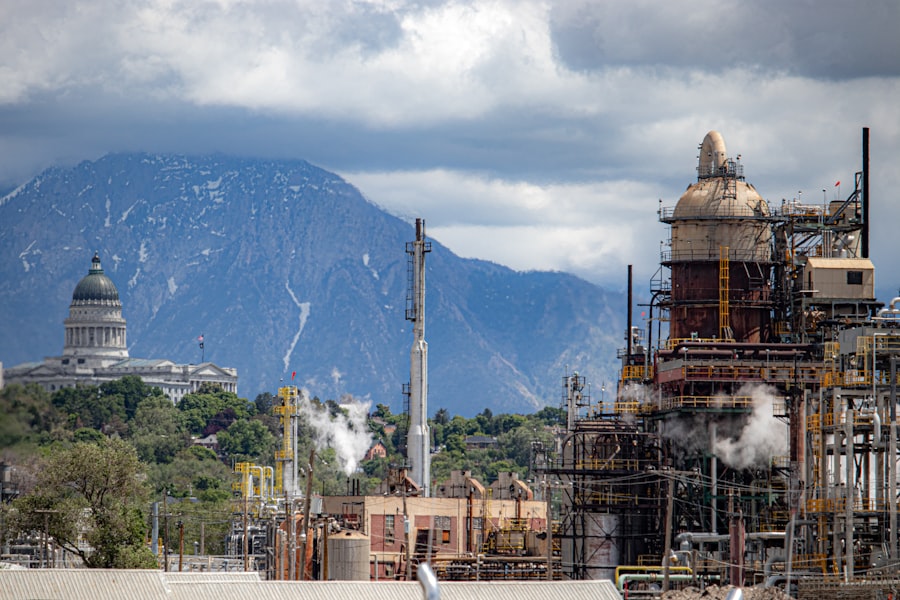In recent years, capitalist economies have faced a significant demand crisis, characterized by a persistent decline in consumer spending and overall economic activity. This phenomenon has raised concerns among economists, policymakers, and business leaders alike, as it threatens the very foundation of economic growth that capitalism relies upon. The demand crisis is not merely a temporary setback; it reflects deeper structural issues within the economy that require urgent attention.
As consumer confidence wanes and purchasing power diminishes, the ripple effects can be felt across various sectors, leading to stagnation and potential recession. The demand crisis is often exacerbated by external shocks, such as global pandemics or geopolitical tensions, which can disrupt supply chains and create uncertainty in the market. However, it is essential to recognize that these external factors are not the sole contributors to the crisis.
Internal dynamics, including shifts in consumer behavior, income distribution, and the overall economic environment, play a crucial role in shaping demand. Understanding these complexities is vital for developing effective strategies to revitalize consumer spending and stimulate economic growth.
Key Takeaways
- Consumer spending plays a crucial role in driving economic growth in capitalist economies.
- Income inequality has a significant impact on consumer demand, leading to declining purchasing power for a large portion of the population.
- Government policies and interventions are essential in addressing the demand crisis, such as implementing stimulus packages and social welfare programs.
- Business investment is vital in stimulating demand, as it creates jobs and increases consumer purchasing power.
- Technological advancements have a profound influence on consumer behavior and demand, shaping the way businesses interact with their customers.
The Role of Consumer Spending in Driving Economic Growth
Consumer spending is often regarded as the lifeblood of capitalist economies, accounting for a significant portion of gross domestic product (GDP) in many countries. When consumers feel confident about their financial situation, they are more likely to spend money on goods and services, which in turn drives business revenues and encourages investment. This cycle of consumption and investment creates a robust economic environment where businesses can thrive, jobs are created, and innovation flourishes.
Therefore, any decline in consumer spending can have far-reaching consequences for economic growth. Moreover, consumer spending is not just about individual purchases; it reflects broader societal trends and sentiments. When consumers are optimistic about their future prospects, they tend to spend more freely, contributing to a vibrant economy.
Conversely, when uncertainty looms—whether due to economic downturns, political instability, or social unrest—consumers may tighten their belts and reduce discretionary spending. This shift can lead to a downward spiral where decreased demand results in lower production, job losses, and further declines in consumer confidence.
Factors Contributing to Declining Consumer Demand in Capitalist Economies

Several factors contribute to the declining consumer demand observed in many capitalist economies today. One of the most significant is the stagnation of wages relative to the rising cost of living. As housing prices, healthcare costs, and education expenses continue to soar, many consumers find themselves with less disposable income to spend on non-essential items.
This financial strain can lead to a more cautious approach to spending, as individuals prioritize necessities over luxuries. Additionally, changing demographics play a crucial role in shaping consumer demand. Younger generations, such as millennials and Gen Z, exhibit different spending habits compared to their predecessors.
They tend to prioritize experiences over material possessions and are more inclined to support sustainable and ethical brands. This shift in values can lead to a mismatch between traditional business models and evolving consumer preferences, further exacerbating the demand crisis.
The Impact of Income Inequality on Consumer Demand
| Income Inequality Level | Consumer Demand Impact |
|---|---|
| High | Decreased demand for luxury goods |
| Low | Increased demand for basic necessities |
| Moderate | Stable demand for mid-range products |
Income inequality has emerged as a critical factor influencing consumer demand in capitalist economies. As wealth becomes increasingly concentrated among a small percentage of the population, the purchasing power of the majority diminishes. This disparity creates a two-tiered economy where affluent consumers drive demand for luxury goods while lower-income individuals struggle to meet basic needs.
Consequently, overall consumer spending suffers as a significant portion of the population is unable to participate fully in the economy. Moreover, income inequality can lead to social unrest and dissatisfaction among those who feel left behind. When large segments of society perceive that they are not benefiting from economic growth, it can result in decreased consumer confidence and increased reluctance to spend.
This sentiment can create a vicious cycle where declining demand leads to further economic stagnation, perpetuating the very inequalities that contributed to the crisis in the first place.
Government Policies and Interventions to Address the Demand Crisis
In response to the demand crisis, governments around the world have implemented various policies and interventions aimed at stimulating consumer spending and revitalizing economic growth. Fiscal measures such as direct cash transfers, tax cuts, and increased public spending have been employed to boost disposable income for households. By putting money directly into consumers’ hands, governments hope to encourage spending and stimulate demand across various sectors.
Monetary policy also plays a crucial role in addressing the demand crisis. Central banks may lower interest rates or implement quantitative easing measures to encourage borrowing and investment. By making credit more accessible and affordable, these policies aim to spur consumer spending and business investment alike.
However, the effectiveness of these interventions can vary based on prevailing economic conditions and consumer sentiment.
The Role of Business Investment in Stimulating Demand

While consumer spending is vital for economic growth, business investment also plays a crucial role in stimulating demand within capitalist economies. When businesses invest in new technologies, infrastructure, or workforce development, they create jobs and enhance productivity. This investment not only leads to increased output but also generates additional income for workers who can then contribute to consumer spending.
Furthermore, business investment can drive innovation and competitiveness within industries. Companies that invest in research and development are more likely to introduce new products and services that meet evolving consumer needs. This innovation can create new markets and opportunities for growth, ultimately leading to increased demand as consumers seek out the latest offerings.
Globalization and its Effects on Consumer Demand in Capitalist Economies
Globalization has had profound effects on consumer demand in capitalist economies, reshaping how goods and services are produced and consumed.
However, globalization also presents challenges that can dampen consumer demand. The outsourcing of jobs to lower-cost countries can lead to job losses in higher-cost economies, resulting in decreased purchasing power for affected workers. Additionally, as local businesses struggle to compete with multinational corporations, communities may experience economic decline that further erodes consumer confidence and spending.
Technological Advancements and their Influence on Consumer Behavior and Demand
Technological advancements have significantly influenced consumer behavior and demand patterns in recent years. The rise of e-commerce has transformed how consumers shop, allowing them to access products from around the world with just a few clicks. This convenience has led to an increase in online shopping and a shift away from traditional brick-and-mortar retail experiences.
Moreover, technology has enabled businesses to gather vast amounts of data on consumer preferences and behaviors. This data-driven approach allows companies to tailor their offerings more effectively, creating personalized experiences that resonate with consumers. However, this reliance on technology also raises concerns about privacy and data security, which can impact consumer trust and willingness to engage with brands.
Strategies for Businesses to Navigate the Demand Crisis in Capitalist Economies
In light of the ongoing demand crisis, businesses must adopt innovative strategies to navigate these challenging economic conditions successfully. One approach is to focus on enhancing customer experience by providing exceptional service and building strong relationships with consumers. By prioritizing customer satisfaction and loyalty, businesses can encourage repeat purchases even during periods of economic uncertainty.
Additionally, companies should consider diversifying their product offerings or exploring new markets to mitigate risks associated with declining demand in specific sectors. By adapting to changing consumer preferences and identifying emerging trends, businesses can position themselves for growth even amidst challenging circumstances.
The Importance of Sustainable and Inclusive Economic Growth in Addressing the Demand Crisis
Addressing the demand crisis requires a commitment to sustainable and inclusive economic growth that benefits all segments of society. Policymakers must prioritize initiatives that promote equitable wealth distribution and support marginalized communities. By investing in education, healthcare, and job training programs, governments can empower individuals with the skills needed to participate fully in the economy.
Sustainable practices also play a crucial role in fostering long-term economic resilience. Businesses that prioritize environmental responsibility not only contribute positively to society but also appeal to increasingly conscious consumers who value sustainability. By aligning economic growth with social responsibility, societies can create a more robust foundation for addressing the demand crisis.
The Future of Capitalism and Potential Solutions to the Demand Crisis
The future of capitalism hinges on its ability to adapt to evolving challenges such as the demand crisis. As societies grapple with issues like income inequality, technological disruption, and environmental sustainability, there is an urgent need for innovative solutions that promote inclusive growth. This may involve rethinking traditional business models or exploring alternative economic frameworks that prioritize social welfare alongside profit.
Potential solutions could include implementing universal basic income programs or expanding access to affordable healthcare and education. By addressing systemic inequalities and fostering an environment where all individuals can thrive economically, capitalism can emerge stronger from this crisis. Ultimately, the path forward will require collaboration among governments, businesses, and communities committed to building a more equitable future for all.
In recent discussions about the challenges facing modern economies, the concept of a demand crisis within capitalism has gained significant attention. This issue revolves around the idea that consumer demand is not keeping pace with the productive capacity of economies, leading to potential stagnation. For a deeper exploration of this topic, you can read a related article on the dynamics of wealth and economic growth at How Wealth Grows. This article delves into the intricacies of how wealth distribution and consumer spending power can impact overall economic health, providing valuable insights into the ongoing debate about capitalism’s ability to sustain growth in the face of demand challenges.
WATCH THIS! The AI Paradox: Who Buys the Stuff When Nobody Has a Job?
FAQs
What is capitalism?
Capitalism is an economic system characterized by private ownership of the means of production and the pursuit of profit. In a capitalist system, goods and services are produced and distributed based on supply and demand in a market economy.
What is a demand crisis in capitalism?
A demand crisis in capitalism occurs when there is a significant decrease in consumer demand for goods and services. This can lead to a decrease in production, layoffs, and a slowdown in economic growth.
What causes a demand crisis in capitalism?
A demand crisis in capitalism can be caused by various factors, including economic downturns, financial instability, high levels of debt, and changes in consumer behavior. External shocks such as natural disasters or pandemics can also contribute to a demand crisis.
How does capitalism respond to a demand crisis?
In response to a demand crisis, capitalist economies may implement monetary and fiscal policies to stimulate demand, such as lowering interest rates, increasing government spending, or providing tax incentives. Businesses may also adjust their production levels and pricing strategies to adapt to changing consumer demand.
What are the potential consequences of a demand crisis in capitalism?
A demand crisis in capitalism can lead to reduced economic growth, increased unemployment, and financial instability. It can also exacerbate income inequality and lead to social and political unrest. Governments and central banks often work to mitigate these consequences through various policy measures.
